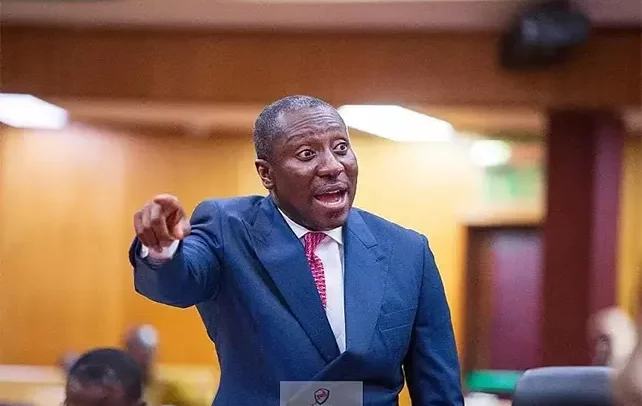The Minority in Parliament has raised fresh alarm over the worsening scourge of illegal mining, known locally as galamsey, describing it as Ghana’s gravest governance failure and a full-blown national disaster that threatens lives, livelihoods, and the country’s environmental future.
Addressing Parliament at the opening of the Third Meeting of the First Session, Minority Leader, Alexander Afenyo-Markin, delivered a sobering account of what he called “the poisoning of Ghana’s soul,” warning that unchecked illegal mining has pushed the nation to the brink of irreversible ecological collapse.
“Even as we convene today, our rivers run brown with pollution, vast tracts of once fertile land lie scarred and toxic, and many of our citizens in mining communities face illness and death from poisonous chemicals,” Afenyo-Markin declared.
He cited new findings by Pure Earth and Ghana’s Environmental Protection Agency (EPA), which revealed that mercury contamination in some mining communities is 134 times above safe levels, while arsenic concentrations have surged 4,000 percent higher than World Health Organisation (WHO) standards.
“These poisonous metals are seeping into the water, into food crops, into the very bodies of our people. Doctors are reporting children with mercury pellets in their X-rays, children now requiring dialysis because of the poisonous fruits of galamsey,” he lamented.
The Minority Leader said the menace had persisted across successive governments but had worsened under the current administration.
Recounting earlier warnings, he cited the 2010 Africa Investigates documentary by journalist Anas Aremeyaw Anas, which exposed the human and environmental toll of galamsey, including the Dunkwa-on-Offin pit disaster that killed over 150 people.
The Minority Leader described the crisis as both an environmental and an economic catastrophe, noting that the rise of unregulated small-scale gold mining has created an underground economy draining state revenue while empowering criminal networks.
“In just eight months this year, small-scale gold exports surged to over $6.3 billion, according to the Ghana Gold Board. Yet much of this trade is believed to be illicit. The state loses billions while communities suffer devastation,” he said.
He called for a non-partisan national crusade against illegal mining, anchored on transparency, accountability, and sustainable livelihoods for affected communities.
The Minority Leader urged the government to work with civil society, religious bodies, and traditional authorities to design an all-inclusive recovery plan for degraded mining zones.
“If we fail to protect our rivers, land, and communities, we risk failing an entire generation,” he warned.
By Ernest Kofi Adu, Parliament House


